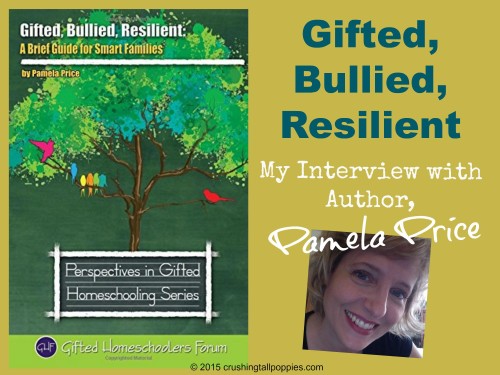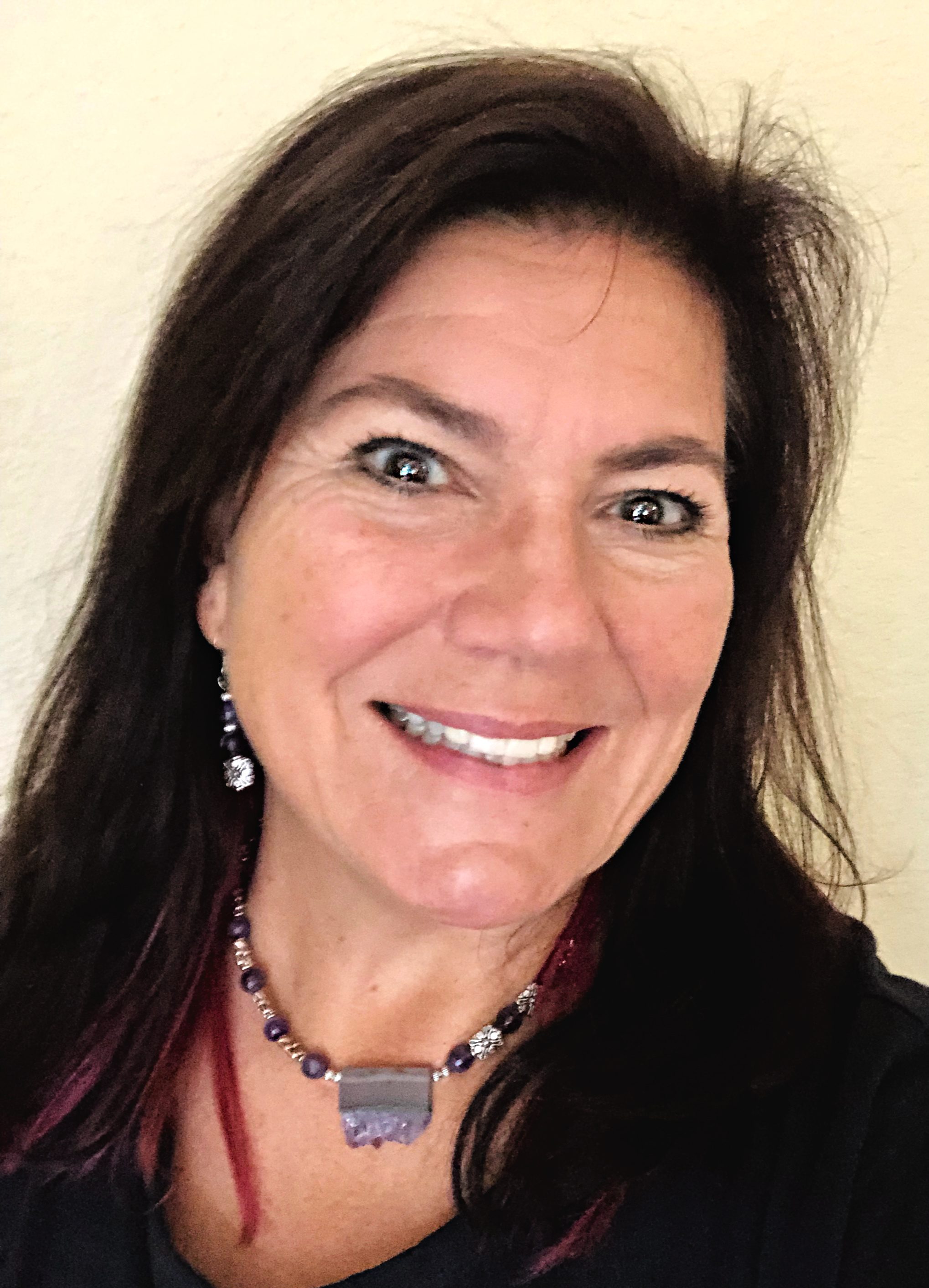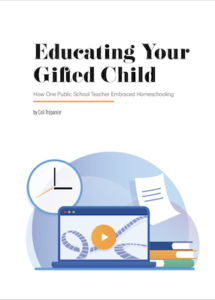Gifted, Bullied, Resilient: My Interview with Author, Pamela Price
Posted by Celi Trépanier on Monday, August 10, 2015 · 3 Comments

Gifted, Bullied, Resilient: A Brief Guide for Smart Families is the second book by GHF Press author, Pamela Price.
Your perception of bullying and how to deal with it will not be the same after reading this book. The act of bullying, and the role of the victim, the victim’s family, the bully, the bystander, the school and parents–all are clearly defined using related examples and resources. Understanding more about the details of the sociology and psychology behind bullying helped me to understand more clearly what is going on in a bullying situation and the consequences to those affected. I appreciated the balance found in this book–the roles of the victim, the bully and the family, even the bystander, were treated objectively and honestly.
The following is my interview with Pamela about her new book, Gifted, Bullied, Resilient: A Brief Guide for Smart Families.
1. In your book, you spoke about your own childhood experience with bullying. How did this experience guide the writing of your book?
Simply put, the younger me needed an adult to help me (and my family) make sense of what was happening and teach me what I could do about it. In writing this little book, I was reaching back to myself and out to others. Much to my surprise several parents have shared it with their children and teens.
2. You gathered so many personal stories and did a tremendous amount of research for your book. How did reading these personal stories affect you emotionally? Any new information or something that really stood out for you in your research?
Mindfulness training helped me manage the surge of emotions that I felt while researching and writing. In fact, thanks to my eldercare role (one of many hats), the second chapter was written in a busy ER while my mother was ill and the sobbing woman in the next bed recounted a sexual assault to a police office. I have learned so much about emotional regulation through the very process of working on this text that I could write another book on that topic alone. In a word it has been transformative.
3. When most of us think about bullying, we think of schoolyard bullies. We know not all bullying occurs in school, but from your research, what would you say are the main strategies schools could easily employ now to curb bullying at their school?
Zero tolerance is ineffective. We need to accept that reality. What looks to be most promising is mindfulness training and social skills work for teachers, administrators, and students. Teaching positive social skills, helping kids with a “rage to master” other people find positive outlets, and learning to discern ordinary “mean words” from true bullying episodes are vital first steps for all of us.
4. As a public school teacher, one thing I did to prevent unchecked bullying was to let my students know that tattling was okay with me—I listened to everything every child told me to make sure I did not overlook unwanted behavior or issues. What one thing would you say a classroom teacher can do to reduce the opportunity for bullying to occur in her or his classroom?
Our children need to learn how to articulate to one another how specific actions and words impact them both negatively and positively. After all, interpersonal communication skills are the foundation on which all adult relationships are based. Educators can help build a bridge between kids who are out of step with one another socially. They can do this by supporting positive interpersonal communication within and outside of the classroom (playground, lunchroom, busses, library, etcetera). Educators can also model appropriate behavior and be inclusive in their own speech and body language to help prevent individual kids from being marginalized.
Again, mindfulness work is of great benefit at home and in school settings alike. Several excellent resources for parents and educators are mentioned in the book, and I think adults will find the material useful if not illuminating. So many parents with whom I spoke shared that as they addressed their child’s bullying experience, they also unpacked their own painful personal stories of bullying, sometimes decades after the fact. Bullying really is a lifetime issue, not something found only in our schools or homeschool coops.
Pamela Price is a writer and parent educator based in San Antonio, Texas. A former university educator, she is currently a GHF: Gifted Homeschoolers Forum board member.
You can find Pamela and her new book here:
Gifted Bullied, Resilient: A Brief Guide for Smart Families–GHF Book Page
Pamela Price’s Amazon Author Page
Blog: Red, White & Grew
Twitter: @redwhiteandgrew
Facebook: Facebook.com/RedWhiteandGrew
Pinterest: PamelaOPrice
Category: Bullying, Gifted, Parenting a Gifted Child · Tags: bullying, emotional intensity, gifted, gifted adult, gifted children, public schools
3 Comments on “Gifted, Bullied, Resilient: My Interview with Author, Pamela Price”
Leave a Reply Cancel reply
This site uses Akismet to reduce spam. Learn how your comment data is processed.
Subscribe to Crushing Tall Poppies
About the Author

Privacy and Disclosure Statement
My Top Posts
- The Best Resources for Gifted Adults
- “He’s smart, but he just needs to apply himself." Just Wondering Out Loud
- Gifted, Empathic, Emotionally Intense, and Highly Sensitive
- Being Gifted is Often NOT the Same as Being High-Achieving
- A Gifted Child Checklist for Teachers
- Learning to Live the Life of a Gifted Adult
- Gifted Children: The Differences are Real
- Are Gifted People Arrogant?
- Dear Teacher, My Gifted Child is in Your Class
- It's a Funny Thing: A Gifted Child's Sense of Humor
Follow Crushing Tall Poppies on Twitter
My Tweets
 Crushing Tall Poppies
Crushing Tall Poppies



As someone who fought violent bullies, won and gained confidence and resilience thereby as a child, I hope she punished bullies and let her students know self-defense is okay when (not if) bullies get violent. (Children, even gifted ones, are horribly uncivilized and to “use your words” with a bully too often means getting beaten.) To forbid self-defense enforces victims’ helplessness and lets bullies (who don’t care) run riot… why many kids in such circumstances kill themselves (e.g., after humiliating social media comments they could delete or not participate in by accessing) today.
You bring up some good points!
Handling bullying is such a balancing act. As a parent, I’ve often gone back and forth on the approach I’ve coached my kids to use. Ironically, one of my sons mentioned in his mid-20’s that I should have allowed him to beat up his bullies because it would have given him more confidence to stand up for himself, and that coming from the son who had been the least bullied, and the most docile. I really took what he said into consideration. Maybe it all depends on the bullying situation–what the bully is doing, how your child is affected, etc.
And though “using your words” is often the go-to advice parents give, one of my sons went to a school who had a rule for the victims, too: “Do not respond to the bully or try to stand up for yourself. This will escalate the bullying.” I found this to be the most oppressing advice, but it was meant to serve the school, not the victim. If the victim did respond to the bully, he was held equally responsible for the incident. We changed schools soon after because like you said, “To forbid self-defense enforces victims’ helplessness and lets bullies (who don’t care) run riot… why many kids in such circumstances kill themselves.”
Did you see all of the posts on Bullying from the Gifted Homeschoolers Forum Blog Hop ? I learned so much that I didn’t know before.
Pingback: “Gifted, Bullied, Resilient”: Blog Reviews, Thus Far | Red, White & Grew™ with Pamela Price